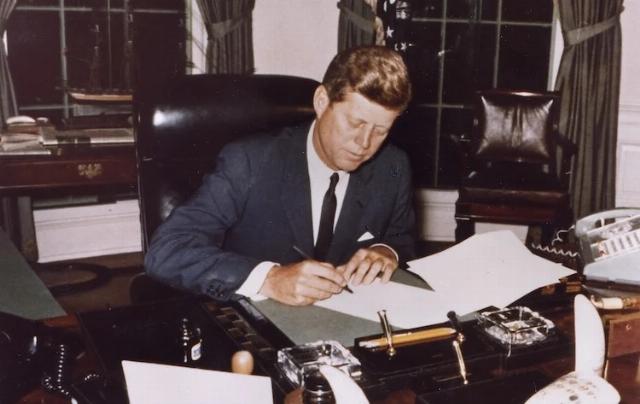John F. Kennedy’s big mistake
“Let every nation know, whether it wishes us well or ill, that we shall pay any price, bear any burden, meet any hardship, support any friend, oppose any foe to assure the survival and the success of liberty.”
—John F. Kennedy’s inaugural address
When I heard these words on that January day in 1961, I shuddered and asked aloud, “What have we done?” I was horrified.
But what we had done by electing Kennedy was already clear enough, as the tale of death and waste from Vietnam to Afghanistan in my lifetime has made abundantly clear. An American president was making an open-ended American commitment to endless costs, burdens, and hardships — for “the success of liberty.” Quite soon, Americans were dying in wars far from home in countries that no number of American lives sacrificed or any amount of American treasure spent could make into successes for liberty.
Even changing Kennedy’s proclamation to make it about assuring the survival and success of American liberty accomplishes little; it remains very far from putting America first. Instead, it is all about America’s costs, America’s burdens, America’s hardships, and America’s commitment to get involved anywhere around the world. America sacrificing itself for whomever, wherever, quite simply amounts to putting America last, does it not?
It is just common sense that the president and everyone else in the federal government will, to the best of their ability, put America first, especially in foreign policy.
And that was the foreign policy America once followed, as my friend Angelo Codevilla has made clear in his brilliant book on the subject, America’s Rise and Fall Among Nations: Lessons in Statecraft from John Quincy Adams. It begins with these words: “This book contrasts the successful foreign relations under presidents from George Washington to Theodore Roosevelt with the disarray resulting from Progressive management ever since.”
Although it was practiced by America’s leaders throughout America’s long era of peace with other nations, America’s original foreign policy was most clearly articulated by John Quincy Adams. Codevilla presents Adams’s view with simple clarity:
Just as others’ business, others’ quarrels, and others’ objectives are rightfully and inescapably their own, America is the sole, sovereign judge of its own business, of what our own safety and welfare require. This, Adams argued, is international law as well as common sense.
If you are having difficulty understanding President Trump’s America First common-sense foreign policy, that is perfectly understandable. We have all been conditioned by the agony that has been the price of our elites’ globalist/Progressive foreign policy, making it difficult for even well intentioned and well informed Americans to understand what we are witnessing today.
My suggestion: let my friend Brian Kennedy help you.
While you are at it, please consider letting my friend Roger Kimball help you, too.
This person, whom I do not know, also makes an interesting contribution.
In my judgment, what we are witnessing is a historic turning point: A very great president is attempting to restore America, to make it the common sense nation once more.
Robert Curry is the author of Common Sense Nation: Unlocking the Forgotten Power of the American Idea and Reclaiming Common Sense: Finding Truth in a Post-Truth World. Both are from Encounter Books. His articles and reviews have appeared in American Greatness, the American Thinker, the Claremont Review of Books, and The Federalist.

Image via National Archives, public domain.